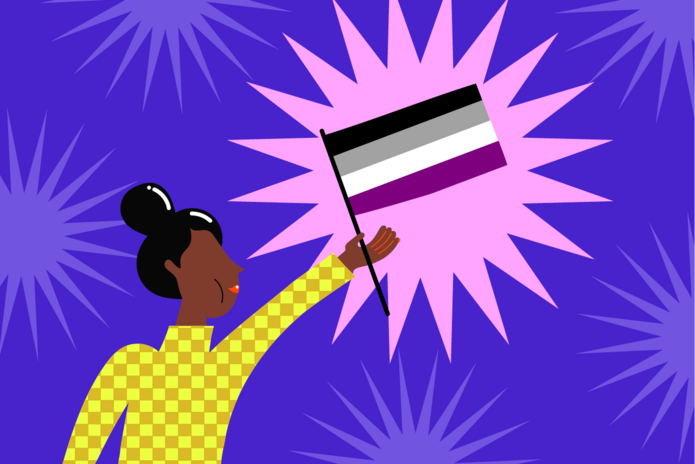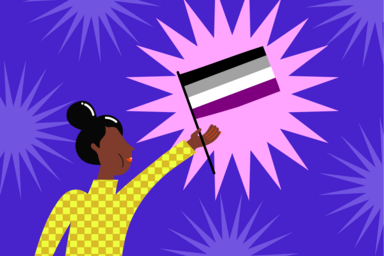“I’m asexual and I still enjoy sex, just in a different way that I don’t need to describe to be valid”
-Oliver Quincy (ig @myautisticsoul)
Speaking like a true weisenheimer, aces who conceal their asexuality are either still shuffling or have their orientation up their sleeve. With this short and possibly snide remark that tells a lot about the current generation’s disposition, I would like to define asexuality as an umbrella under which people who see sex as an afterthought but not a driving force exist. In a diverse sense, but not limited to it, this means the ones who experience very little to no sexual attraction to people of any gender, further characterizing them into spectrum identities and micro labels.
The myriad shades of this sexual orientation are often seen as the defects of some underlying psychological condition or as a promise of celibacy or abstinence. Not only is it extremely hypocritical to deny the existence of someone’s sexuality simply because one can’t understand or relate, but it is also the question mark inflicted on the person’s identity that restricts them from being their most liberated self. Individual identity to every being, be it a name or a belief, defines the evolution of themselves throughout their life. The special sense of attachment or ownership you have over the choices you make or the realization you come to answer the questions that arise by the virtue of us being people. Being told that asexuality is a lifestyle choice and not a part of one’s own self restrains aces from embracing their sexuality as a legitimate identity.
To see ace individuals battling these misconceptions their whole life, separating facts from fiction only to be alienated from our hetero-normative society explains the dysphoria they face regarding these set labels defined by the people. Neither is it the state of being in a ‘dry spell’ nor is it just a choice.
When I say that we live in a hypersexualized society, I mean it in a quite literal sense. With lust and desire pulsating through our entire culture (predominantly western), spread to the point where I turn on the radio and the majority of songs are about or a euphemism for sexual attraction. Societies and mass media have internalized the whole concept, thus treating people like they’re inadequate if they don’t relate to it. When did the world come to a point where your existence is validated by your sexual orientation? Even after the aforementioned precedents, the whole thing is disagreed upon by the same people who don’t respect a non-sexual romantic relationship while having a perfect understanding of hook-up culture. Due to the lack of public prominence and acknowledgment, the ‘A’ in lgbtqia2s+ has been dubbed as the ‘forgotten’ orientation leading to dominant societal views and marginalization of the community.
Media portrayals of asexuality have problematic tendencies in regard to representing the ace community’s identity and sense of emotional significance. The Big Bang Theory, one of the most loved sitcoms and personally, one I could depend upon to be the perfect comfort show presents asexuality as a laughing track by refusing to acknowledge it as a valid identity. Sheldon’s characterization of being asexual, seemingly, is shown as a constant source of comedy. Instead of being an orientation that anyone might have, asexuality is portrayed as an attribute of the character who is written as a robotic being, unable to comprehend social norms and basic human interactions. The producers and writers did a terrible job of representing the ace and queer community by not stating Sheldon’s sexuality and, in turn, reinforcing the harmful idea that sex is a prerequisite to a romantic relationship. And what probably doubles the hilarity is the quintessential sitcom laugh-track and how the character is viewed by his circle of friends.
Somehow, meeting the ‘right’ person to ‘fix’ your asexuality is an idea that seems to be applied to ace individuals more than the other orientations. Attempts to ‘cure’ Sheldon are made throughout the show. This tells the viewers that if an asexual person is encouraged to have sex, it will unlock their desires thus making their orientation insignificant. These attempts also invalidate the aces who have found ‘the one.’
Pop culture and media have had a patchy record with the ace community due to their enraging and discouraging way of representing them. This may be either because they’re not sufficiently equipped or lack the initiative to make the show more diverse by giving power to asexuality. A good example and probably only example of a good/multidimensional ace character in mainstream media is Todd Chavez from BoJack Horseman. The character is out rightly ace which gives a fresh lens through which the community can be viewed.
And hopefully, through smart representations like these, we can perhaps get to a place where we don’t perceive asexuality as a desire disorder.


